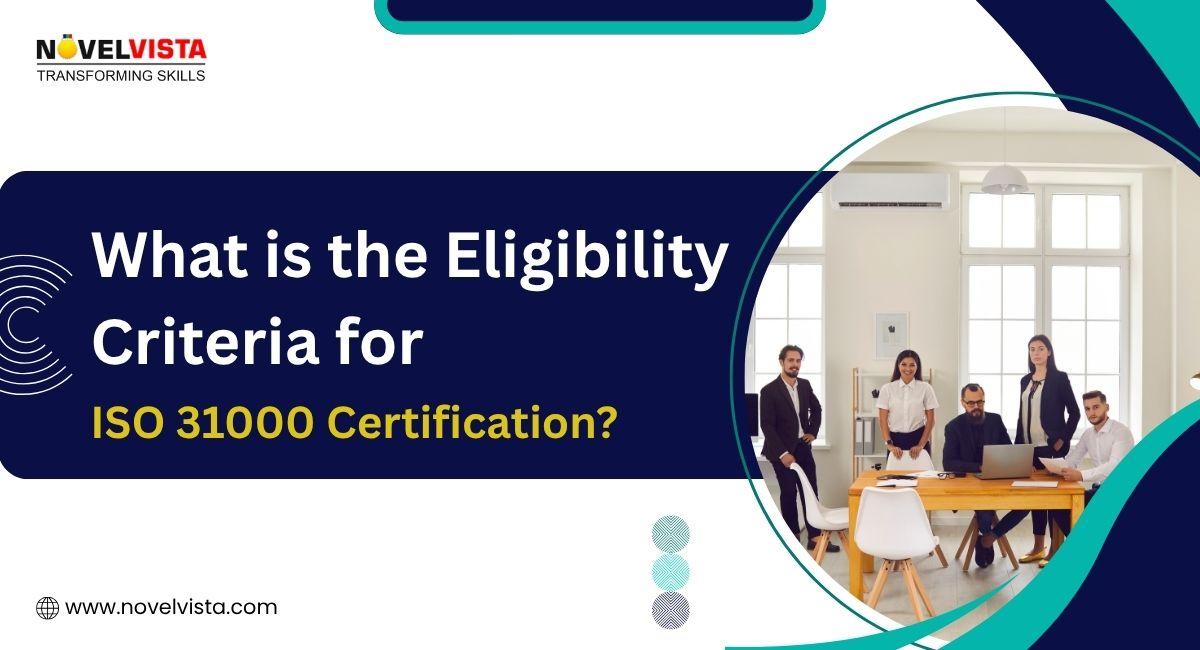What is the Eligibility Criteria for ISO 31000 Certification?

What is the Eligibility Criteria for ISO 31000 Certification?
ISO 31000:2018 is a globally recognized risk management standard that provides principles, frameworks, and processes for managing risk effectively. Whether you are an individual professional looking to enhance your career or an organization aiming to implement a risk-based approach, ISO 31000 certification can add significant value.
One of the most common questions professionals ask is: "Am I eligible for ISO 31000 certification?" In this article, we’ll break down the eligibility criteria, ideal candidate profiles, and what you need to know before enrolling in a certification program.
Who Can Apply for ISO 31000 Certification?
The good news is that ISO 31000 certification is open to a wide range of professionals. Unlike some certifications that have strict prerequisites, ISO 31000 does not require formal education in risk management or a specific number of years of experience. However, certain background knowledge and professional experience can enhance your learning and success in the certification process.
Ideal Candidates Include:
-
Risk Managers and Risk Analysts
-
Compliance Officers
-
Internal Auditors
-
Governance Professionals
-
Project Managers
-
Quality Management Officers
-
Financial Analysts
-
Operations and Safety Managers
-
Senior Executives overseeing risk strategies
In essence, anyone involved in assessing, managing, or overseeing risk within an organization can benefit from ISO 31000 certification.
General Eligibility Requirements
Although formal requirements are minimal, training providers and certification bodies may have their own eligibility conditions. The following are the commonly accepted baseline criteria:
1. Basic Educational Background
While not mandatory, a minimum qualification such as a high school diploma or undergraduate degree is generally recommended. Having a background in business, finance, operations, engineering, or compliance can help you grasp the risk management concepts more easily.
2. Work Experience
No formal work experience is strictly required, especially for foundation-level courses. However, for intermediate or advanced ISO 31000 certifications, many training providers recommend:
-
1–2 years of professional experience in risk-related roles
-
Practical exposure to risk assessment or compliance activities
This ensures that learners can relate the ISO 31000 principles to real-world situations.
3. Understanding of Risk Concepts
You don’t need to be a risk management expert to start, but having a basic understanding of terms like risk identification, risk assessment, controls, and mitigation will help you during the training and exam.
Some providers may offer a pre-course assessment or self-paced introductory module to bring learners up to speed.
Types of ISO 31000 Certifications and Their Criteria
Different levels of ISO 31000 training may have varying eligibility expectations:
✅ Foundation-Level Certification
-
Open to all professionals
-
No experience required
-
Ideal for beginners and new entrants
✅ Risk Manager / Implementer Certification
-
Preferred: 1–3 years of risk or compliance experience
-
Suitable for professionals involved in designing and implementing risk frameworks
✅ Lead Risk Manager / Auditor Certification
-
Preferred: 3–5+ years of experience
-
Some providers may require proof of prior training or project experience
-
Ideal for senior-level professionals responsible for organizational risk strategy
Do You Need to Take a Training Course?
Most recognized certifications require you to complete a training course before attempting the exam. Accredited training partners ensure that:
-
The curriculum aligns with ISO 31000:2018 guidelines
-
You are prepared for both the theoretical and practical aspects
-
You understand real-world application of risk management principles
Final Thoughts
In summary, ISO 31000 certification is accessible to a broad range of professionals, from beginners to senior executives. While there is no strict eligibility enforced by ISO itself, training providers often recommend certain education or experience levels depending on the course type.
If you're looking to upskill in risk management or pursue a career in compliance, governance, or auditing, ISO 31000 certification can be a valuable asset—regardless of whether you’re just starting out or already in the field.
- Art
- Causes
- Crafts
- Dance
- Drinks
- Film
- Fitness
- Food
- Jeux
- Gardening
- Health
- Domicile
- Literature
- Music
- Networking
- Autre
- Party
- Religion
- Shopping
- Sports
- Theater
- Wellness
- IT, Cloud, Software and Technology


